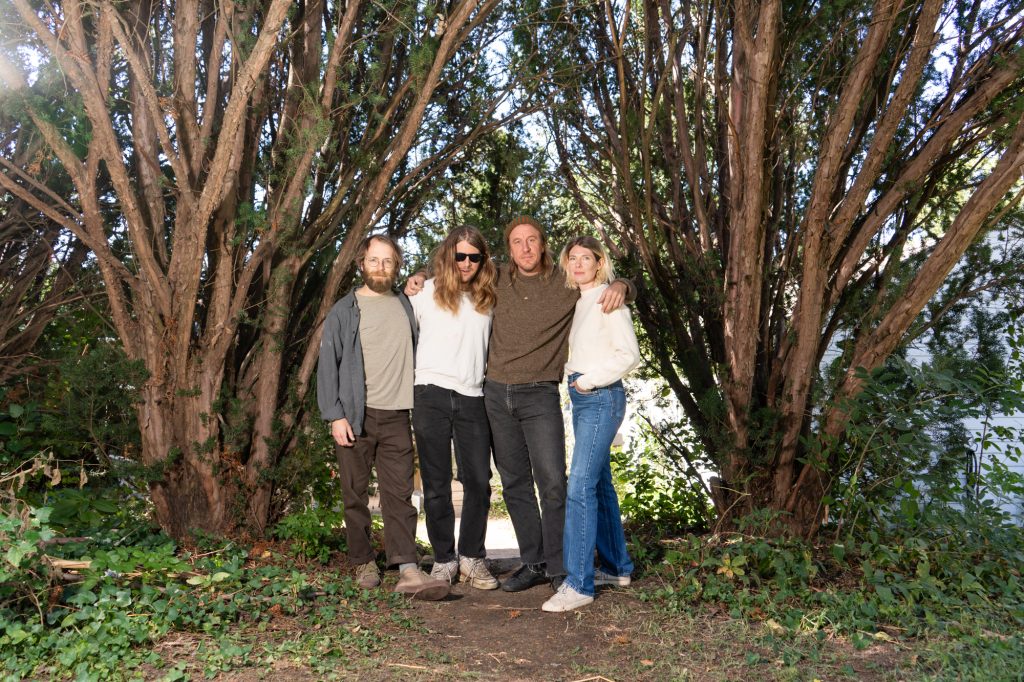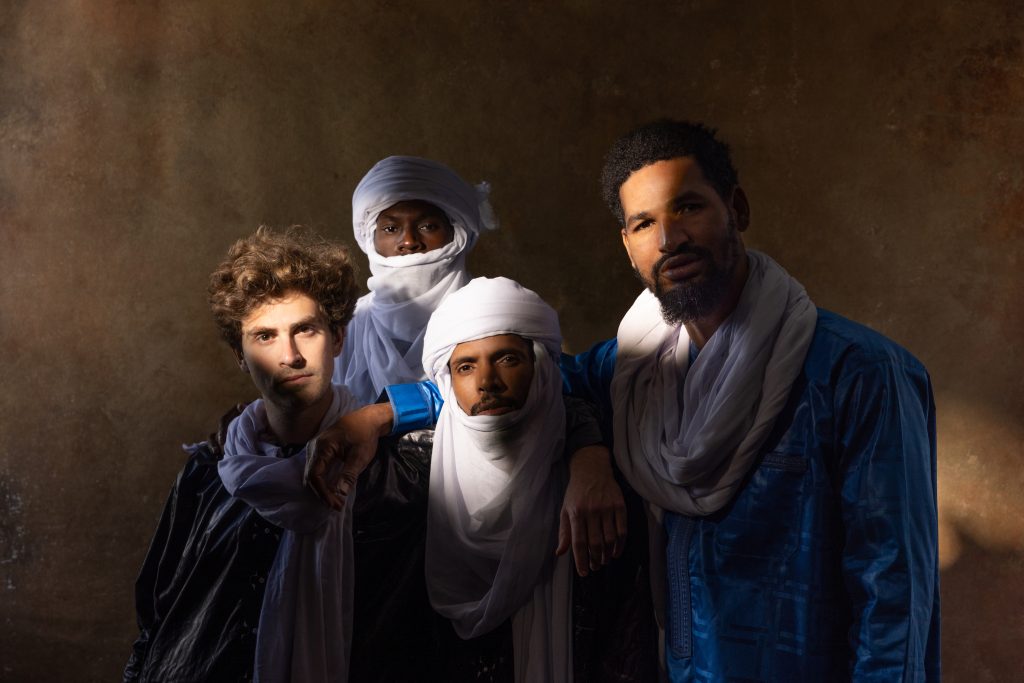
There is a beauty in listening to music made in the spirit of energetic transformation. When the sounds transform the air and the listener. This record transports the listener into the heart of the music of Mdou Moctar. The blending of intention and motivation creates a burst of sound that embraces and shakes and invites one to dance! It invites one to breathe. It invites one to be in solidarity with the music. It invites one to be in touch with the human condition. What does it mean to be free in these times? Can the world be liberated from the colonial mindstate that has caused such harm and mistrust? Can we mourn our losses yet build anew to form something more astounding, more fantastic? Funeral For Justice says we can.
A sound that carries weight makes an impact. A sound that carries time transcends time. We are not only listening to music but we are living through it. We are living with it. We are living in it. The artist sees history and makes poetry from it for the present. Mdou Moctar’s Funeral For Justice requests your presence. Show up open to the celebration of life, loved as it should be loved. Experience the exaltation and exuberance. The words speak of ascension, awareness, sorrow, apathy, knowing, and growth. The guitars speak of power, energy, jubilation, transcendency, immediacy, and tradition. The drums and percussion mark the pulse of now as well as a timeless dance that involves us all, as it did those that came before us. The wires that carry the message feel alive with fire and purpose, explosive with possibility. This “funeral” is an acknowledgment. This “funeral” is abundant. This “funeral” overflows into the street filled with dance. This “funeral” stretches late into the night, kicking up the dirt, with the hum of a generator, an ever present member of the rhythm section. This “funeral” is a clarion call for reason and a belief that change is possible.
So join Mdou Moctar in this funeral for justice, knowing rebirth is possible. A new justice is possible. With your voice, your heart, your dance, your stomp, a new justice is born. Mdou Moctar welcomes you with joy and open arms. Be here. Feel here and do, alongside this music. Don’t stand alone, join with others and do. Fight for liberation. Stand against oppression, alongside this music and do!
– Damon Locks
Funeral For Justice is the new album by Mdou Moctar. Recorded at the close of two years spent touring the globe following the release of 2019 breakout Afrique Victime, it captures the Nigerien quartet in ferocious form. The music is louder, faster, and more wild. The guitar solos are feedback-scorched and the lyrics are passionately political. Nothing is held back or toned down.
The songs on Funeral For Justice speak unflinchingly to the plight of Niger and of the Tuareg people. “This album is really different for me,” explains Moctar, the band’s singer, namesake, and indisputably iconic guitarist. “Now the problems of terrorist violence are more serious in Africa. When the US and Europe came here, they said they’re going to help us, but what we see is really different. They never help us to find a solution.”
“Mdou Moctar has been a strong anti-colonial band ever since I’ve been a part of it,” says producer and bassist Mikey Coltun, who has been playing with Moctar since 2017. “France came in, fucked up the country, then said ‘you’re free.’ And they’re not.” The song ‘Oh France’ tackles this head on: “France’s actions are frequently veiled in cruelty/We are better off without its turbulent relation/It’s high time we grasp the endless lethal games it plays.”
On the lead single and title track, Moctar addresses African leaders directly, bidding them: “Retake control of your resource rich countries/Build them and quit sleeping”. The song ‘Sousoume Tamacheq’ deals with the plight of the Tuareg people to which the band belong, and who are mainly spread across three countries: Niger, Mali and Algeria.”Oppressed in all three/In addition to lack of unity, ignorance is the third issue.” Another song, ‘Imouhar’, calls on the Tuareg to preserve their Tamasheq language – it’s at risk of dying out, and Mdou is one of the few in his community who knows how to write it. “People here are just using French,” laments Mdou. “They’re starting to forget their own language. We feel like in a hundred years no one will speak good Tamasheq, and that’s so scary for us.”
Mdou Moctar in its current iteration is first and foremost a band. Alongside Moctar, it consists of rhythm guitarist Ahmoudou Madassane, drummer Souleymane Ibrahim, and American bassist and producer Mikey Coltun.
The band got their start performing at traditional weddings. These are high energy events – amps are dialed up to 11 and the whole town is invited to attend. “I grew up in the DC punk scene and this is no different,” explains Coltun. “It’s a DIY punk show: people bring generators, they crank their amps. Things are broken, but they make it work.”
Conveying that energy and feeling of community to a new audience has been an important goal for the band. Their first concerts in the US were sometimes, mistakenly, organized to be tame seated affairs. That’s no longer the case. Over 100s of shows, they’ve proven themselves as one of the world’s most vital rock bands – a group rooted in Tuareg tradition, but undeniably its own singular organism. An Mdou Moctar concert is now recognized to be a place for dancing, if not full-force moshing.
“Ilana was the gateway album, saying that this is a raw rock band. And Afrique Victime was a summation of that vision,” says Coltun, who captured the bulk of the recordings over five days in a mostly unfurnished house in upstate New York. “With Funeral For Justice, I really wanted this to shine with the political message because of everything that’s going on. As the band got tighter and heavier live, it made sense to capture this urgency and this aggression – it wasn’t a forced thing, it was very natural.”
In July 2023 – after Funeral For Justice had been completed – Niger’s democratically elected government was deposed in a military coup. The president was placed under house arrest and the nation plunged into a state of chaos and uncertainty. The French have withdrawn. The area continues to be threatened by terrorism. The band – then on tour in the US – was, for a time, unable to return to their families.
“I don’t support the coup,” explains Mdou, “but I never in my life liked France in my country. I don’t hate France or French people, I don’t hate American people either, but I don’t support their manipulative policies, what they do in Africa. In 2023 we want to be free, we need to smile, you understand?”

Rosali
North Carolina-based artist Rosali makes songs that take their time in revealing their full power. What might first appear to be restrained, introspective compositions will stretch slowly outward, snagging your attention with a subtly sideways guitar lead or an exceptionally raw lyric you didn’t catch the first time around. A child of two musicians, Rosali grew up as part of a large family that sang together and taught themselves various instruments, finding the earliest forms of her musical voice harmonizing and making up songs with her sisters. As an adult, Rosali merged this musical upbringing with an active involvement in Philly’s experimental and D.I.Y. community. Her 2016 solo debut Out of Love was released on Siltbreeze, a long-running label that champions abstract noise and challenging listening. While Rosali’s earliest work was far nearer to folk-informed rock than harsh sonics, it held an intensity of its own in its strange angles and unexpected vulnerability. Second album Trouble Anyway expanded on the debut with clearer production and more involved arrangements. A host of friends from Philly’s freak scene contributed to the album, including appearances from ambient harpist/pianist Mary Lattimore, Purling Hiss/Birds of Maya shredder Mike Polizze, glistening lap-steel from Mike Sobel, understated percussion from War On Drugs drummer Charlie Hall, and several others. Trouble Anyway brought Rosali a new level of exposure, with a flood of positive critical press and tours supporting acts like The Weather Station and J Mascis. Along with her solo work, Rosali’s output has materialized as a broad spectrum of disparate collaborations, including the hypnotic garage trio Long Hots, slow-burning psych scrawl in duo Monocot with Cloud Nothings drummer Jayson Gerycz, and Wandering Shade, a three guitar improv act with Headroom’s Kryssi Battalene and Thrill Jockey artist Sarah Louise. Aspects of the more free-floating side of Rosali’s oeuvre inform her songwriting process, with songs often emerging from the ether of lengthy improvisation sessions, new ideas congealing through a boundless exploration of possibilities. Brought to life with help from Omaha’s David Nance Group as the backing band, 2021’s song-centered No Medium was a sharply realized example of Rosali’s distinctive synthesis of metered songwriting and unfettered searching. Around the same time, she offered a completely separate side of her craft with cassette release Chokeweed, a collection of auburn-hued solo guitar improvisations. She followed that in 2023 with the acclaimed improvisational guitar album Variable Happiness released under the moniker Edsel Axle. In whatever form it takes, Rosali’s softly glowing music is malleable and deceptively fluid, able to appear patient and refined or at the edge of unraveling depending on how closely you chose to look. Bite Down, Rosali’s new album made in collaboration with Omaha’s finest David Nance, James Schroeder, and Kevin Donahue, and Destroyer collaborator, Ted Bois is due out March 22, 2024 on Merge Records.



